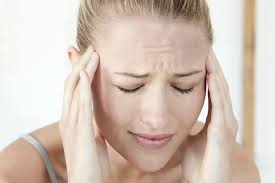 Did you know that in many cases, frequent, or even constant headache pain can be treated more effectively by your dentist, instead of by your GP? Headaches are strange beasts. Their cause is often elusive, and they can range from mildly irritating to unrelentingly painful. Since frequent headaches can interfere with your quality of life, if you experience pain that remains after treatment from a physician, you might wish to see your dentist. After all, you may be suffering from what is called a “dental headache.”
Did you know that in many cases, frequent, or even constant headache pain can be treated more effectively by your dentist, instead of by your GP? Headaches are strange beasts. Their cause is often elusive, and they can range from mildly irritating to unrelentingly painful. Since frequent headaches can interfere with your quality of life, if you experience pain that remains after treatment from a physician, you might wish to see your dentist. After all, you may be suffering from what is called a “dental headache.”
Most dental headaches are classified as “tension” headaches, and are the result of muscular tension that builds up in the region of the face and jaw. Frequently, this tension is a symptom of malocclusion, or – to put it simply – a “bad bite.” All sorts of things can cause a bad bite, including previous dentistry, orthodontics or incoming wisdom teeth. Having a bad bite essentially means the chewing surfaces of the teeth do not meet along a smooth curve when the jaw is shut. This causes the muscles in the jaw to continually overcompensate for the imbalance, resulting in pain and soreness that radiates throughout the head.
This radiating of headache pain is part of why a headache can be difficult to diagnose. Because of the complex nerve structure in this region of the body, where pain is often “referred” from its place of origin to other locations throughout the skull, patients experiencing such pain can unwittingly steer a doctor away from a proper diagnosis by merely focusing on the localization of the pain. So, in instances of referred pain, even though we may be experiencing discomfort in the temple region of our head, for example, the true origin of the pain may be in the musculature surrounding the jaw and the result of an improper bite. The good news is, malocclusion can be fixed rather easily by reshaping teeth that might be too high, or by wearing an orthotic that corrects your bite over time.
Two other issues we see in the dental world that can result in frequent and/or constant headaches areTemporomandibular Joint Disorder (TMJD) and teeth grinding (Bruxism). TMJD occurs as a result of problems with the mechanism of the jaw and its surrounding muscles, and 99% of the time is the result of an injury to the joint. Anything from whiplash to sports trauma, or even something as simple as having your mouth extended too wide for too long in your dentist’s office can trigger TMJ. If you experience frequent “popping” or “clicking” of your jaw, particularly if you’ve ever experienced trauma in this area of your head, you’ll want to visit your dentist for a checkup.
Lastly, Bruxism, a habit even baby can develop; can be another cause of frequent headaches. After all, grinding your teeth for hours upon hours as if you were consuming a Thanksgiving feast all night long puts the muscles of your face through a tremendous workout without rest. If you find that you often wake with a headache that goes away shortly after rising, you may be, in fact, grinding your teeth.
So there you have it, the story of the headache your dentist is best primed to correct. It’s also worth mentioning that, aside from headache causes described above, headache pain can also be caused by more familiar dentistry issues like cavities, a tooth infection or an abscess. All the more reason to visit your dentist to see if that headache you’re always suffering from is actually coming from your mouth.
